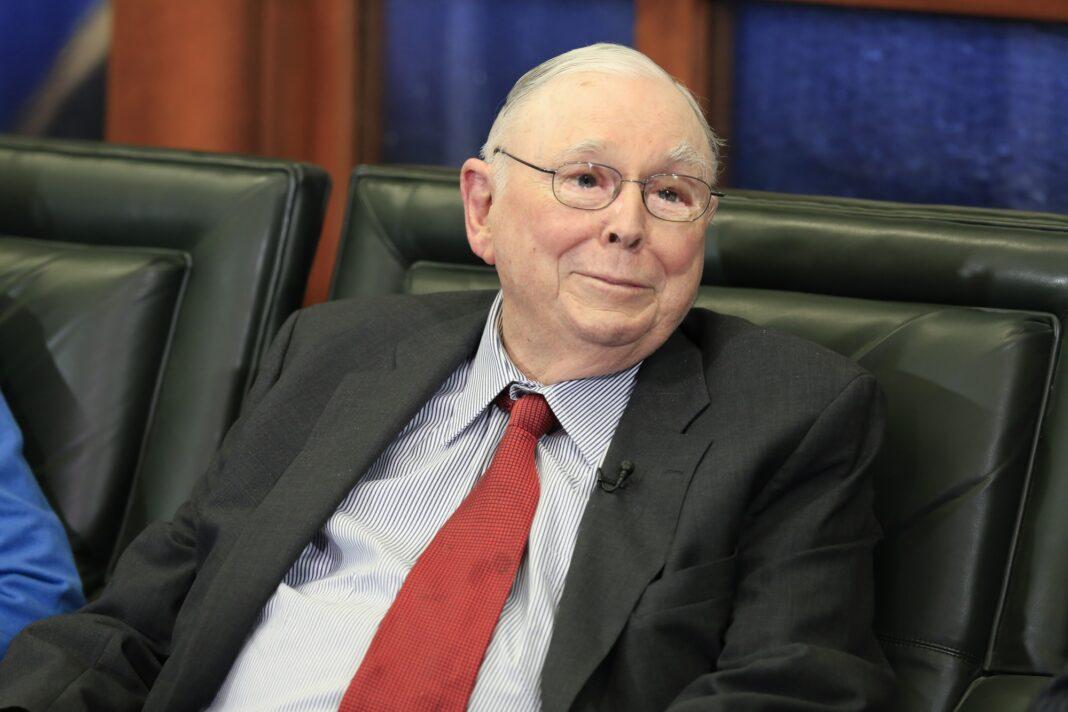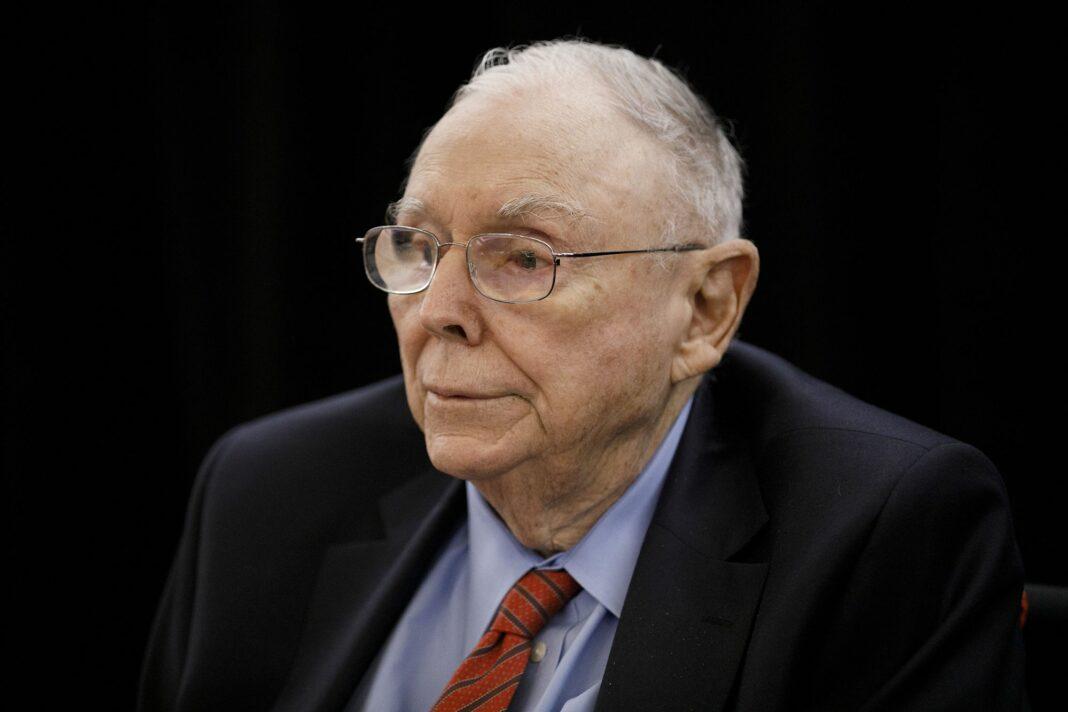What was Charlie Munger’s net worth at the time of his death?
Charlie Munger, the investing sage who made a fortune even before he became Warren Buffett’s right-hand man at Berkshire Hathaway, has died at age 99.
Munger died Tuesday, according to a press release from Berkshire Hathaway. The conglomerate said it was advised by members of Munger’s family that he peacefully died this morning at a California hospital.
According to reports, Charlie Munger had a net worth estimated to be about $ 2.6 billion as of 2023 and the time of his death.

An Omaha native, like Warren Buffett
Charlie Munger was born Charles Thomas Munger on Jan. 1, 1924, in Omaha, Neb. He grew up in the Dundee neighborhood, a half a block from Buffett’s house, and attended the same high school as the investing legend.
He even worked at Buffett’s grandfather’s grocery store as a teenager, though the pair wouldn’t meet until later at the ages of 35 and 29, respectively. When they did finally meet, they became instant friends and partners.
At the age of 17, Charlie Munger enrolled in the University of Michigan to study mathematics only to drop out at the age of 19 during World War II to serve in the US Army Air Corps. While in the Army, he studied meteorology at Caltech in Pasadena, Calif., which became his home.

After the Army, Munger chose to study law, a “natural course of activity” for him given that his father was an attorney and his grandfather was a federal judge.
When Munger applied to Harvard Law School he was initially rejected. He applied again and received his J.D. from Harvard Law School, graduating magna cum laude in 1948. After law school, Munger returned to Los Angeles where he practiced real estate law.
After his father died in 1959, Munger returned to Omaha to sort out his affairs. While there, Munger ate lunch at the Omaha Club with friends who invited Buffett along. The lunch sparked an instant friendship and one of the most important business partnerships ever forged.
Breaking the ‘cigar-butt’ investing habit
In 1962, Charlie Munger started an investment partnership. He also started a law firm, Munger Tolles, but stopped practicing law a few years later to focus on investing.
Buffett credited Munger for breaking his “cigar-butt” investing habit, a strategy the investor learned from Benjamin Graham of finding companies at bargain prices and getting “free puffs” out of them.
While that strategy worked well in Buffett’s early days of managing much smaller sums of money, Munger “set the course for building a business that would combine huge satisfactory profits,” according to an account of Berkshire’s history written by Buffett himself.
“[Charlie’s] most important architectural feat was the design of today’s Berkshire. The blueprint he gave me was simple: Forget what you know about buying fair businesses at wonderful prices; instead, buy wonderful businesses at fair prices,” Buffett wrote.
Buffett also learned the importance of knowing one’s circle of competence from Munger.

“Ben Graham taught me a way to value certain type of business, but the selection of variable companies dried up. Charlie taught me about durable competitive advantage — not how big circle of competence is, but knowing where the edges are most important,” Buffett said at the 2010 annual Berkshire Hathaway meeting.
Charlie Munger often spoke of the importance of understanding “the edge” of one’s competence — in other words, knowing what you don’t know.
“Well it’s a hugely important thing, knowing the edge. It’s hardly a competence if you don’t know the edge of it. You know, if you have a misapprehension regarding your own competency that means you lack competence, you’re going to make terrible mistakes. I think you’ve got to constantly measure what you achieve against other people of achievement, and you have to keep being determinedly rational, and avoiding a lot of self-delusion,” Munger said at the 2019 Daily Journal meeting.
In a 1985 shareholder letter, Buffett said Munger “has always emphasized the study of mistakes rather than successes, both in business and other aspects of life.”
Munger “does so in the spirit of the man who said: ‘All I want to know is where I’m going to die so I’ll never go there.’ You’ll immediately see why we make a good team: Charlie likes to study errors and I have generated ample material for him, particularly in our textile insurance businesses,” Buffett wrote.
To make better decisions in business and life, Munger often deployed what he called a “latticework” of mental models.
“You’ve got to have models in your head. And you’ve got to array your experience — both vicarious and direct — on this latticework of models. You may have noticed students who just try to remember and pound back what is remembered. Well, they fail in school and in life. You’ve got to hang experience on a latticework of models in your head,” Munger said during a 1994 speech at USC’s business school.
‘Just learn, learn, learn all the time’
One of those famed mental models is a phenomenon Munger coined the “lollapalooza effect” in a 1995 speech. At the 2018 Daily Journal meeting, Munger said he came up with the term after reading the main textbooks in introductory psychology and “of course, being Charlie Munger, I decided the psychologists were doing it all wrong and I could do it better.”
“One of the ideas I came up with, which wasn’t in any of the books, was that the ‘lollapalooza effects’ came when three or four of these tendencies were operating at once in the same situation. I can see that it wasn’t linear,” Munger said.
Charlie Munger was also passionate about architecture, a field in which he had no formal training. He developed luxury beachfront homes in Montecito, Calif., nicknamed “Mungerville.” He also designed college dormitories and his own home.

“I think a life properly lived is just learn, learn, learn all the time. I think Berkshire has gained enormously from these investment decisions by learning for a long period,” Munger said at Berkshire’s 2017 annual meeting.
Beyond the investment success, Buffett has repeatedly said that Munger made him “a better person.”
“People find this hard to believe, but in 60 years, we’ve never had an argument. We have disagreed about things and we’ll probably keep occasionally disagreeing about this or that, but if you define an argument where emotion starts entering into it or anger or anything of the sort it just doesn’t, it doesn’t happen,” Buffett said at the 2019 annual meeting.
Munger encountered his fair share of hardship in life. His first marriage to Nancy Huggins ended in divorce. A year later, his 8-year-old son died of leukemia. Munger also lost his eye after a botched cataract surgery.
Munger’s second marriage to Nancy Barry lasted 54 years until his wife’s death in 2010. When asked about relationship advice and finding a good spouse, Munger said, “The best single way is to deserve a good spouse.”
Munger often said the secret to a long and happy life is “simple.”
“You don’t have a lot of envy, you don’t have a lot of resentment, you don’t overspend your income. You stay cheerful in spite of your troubles. You deal with reliable people, and you do what you’re supposed to. All these simple rules work so well to make your life better, and they’re so trite.”
What was Charlie Munger net worth at the time of death?
Charlie Munger net worth
Charlie Munger’s net worth was $2.6 billion when he died on November 28, 2023. This was based on the latest Forbes Billionaires’ list, which ranked him 1,182nd on the list.
Warren Buffett’s net worth was estimated at $119.5 billion that same day.
Berkshire Hathaway, the holding company the two spent nearly 50 years growing together, had a market capitalization of $784.94 billion, making it the 9th-highest-valued public company in the world.
Source: www.www.atinkanews.net
Fact Check: We strive for accuracy and fairness. If you see something that doesn’t look right, contact us!
We appreciate your continuous support in reading stories on Atinkanews.net
Feel free to share this story on different social media platforms.
Don’t forget to follow us on Facebook, Instagram, and Telegram.


